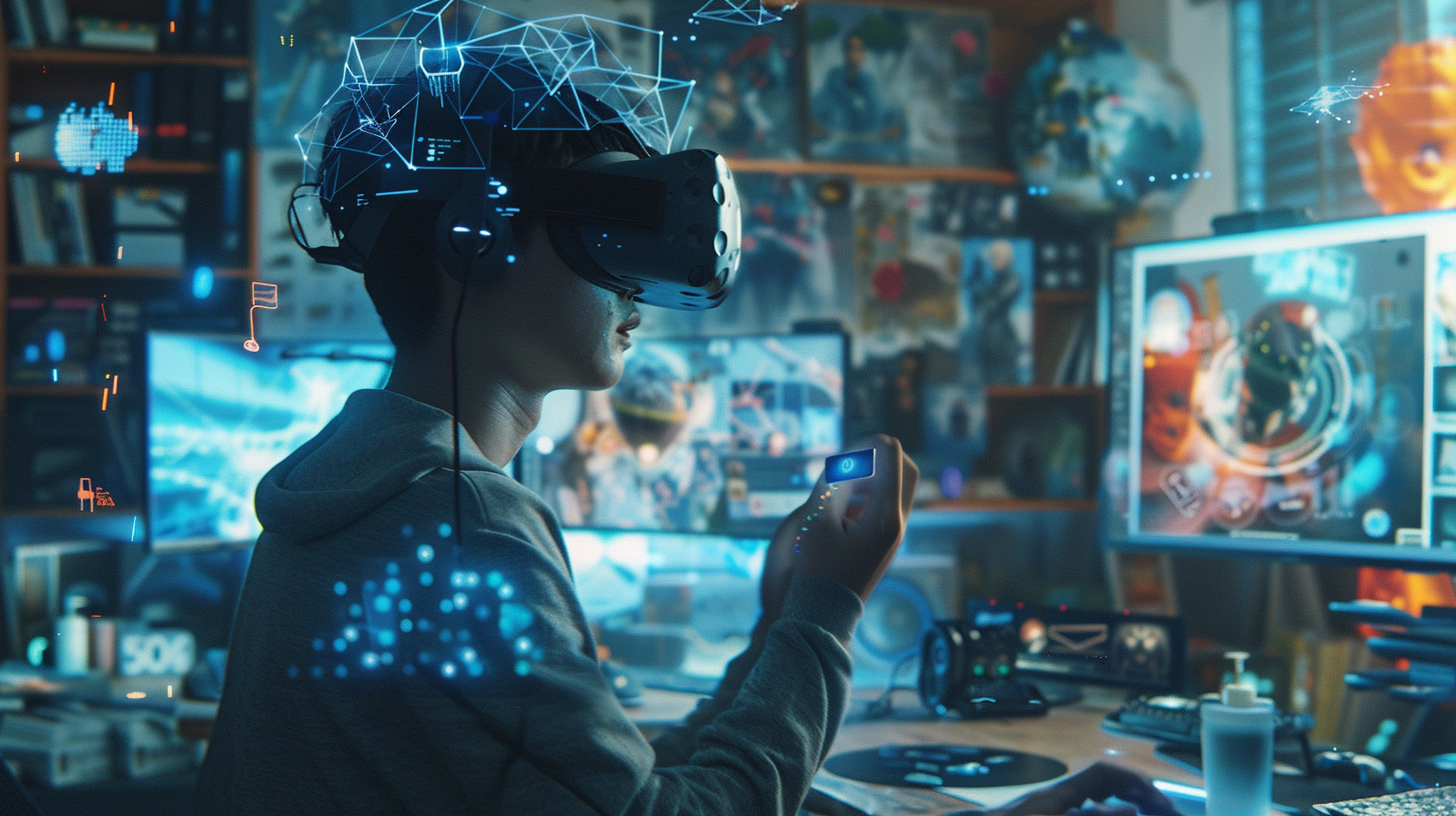4 May 2024 By Johnber

NewsTogether

Game developers like Andrew Maximov and his company, Promethean AI, are using artificial intelligence, or AI, to make creating video games easier and cheaper. AI helps them automate boring tasks, which saves time and money. For example, if they need to build a police station in a game, they can ask AI to help fill it with objects, like putting a doughnut on every desk!
AI is not taking over the whole process; it works alongside human developers. The AI can suggest ideas based on what artists have done before, making it easier for them to be more creative. For instance, AI might add funny details like a sock under a coffee table to make a scene look more realistic.
Another company, Inworld, is also using AI to add details that make game characters seem more real, like showing emotions. They work with Xbox to create better stories in games using a special system they developed. Kylan Gibbs from Inworld says that AI helps them create more exciting and deeper game worlds.
Nick Walton from Latitude.io believes AI will make games more personal. His game, AI Dungeon, lets players choose their own adventures. The AI decides what happens based on the player's choices, making every game unique.
AI is becoming very important in making games, but it doesn't mean that fewer humans will be needed. Instead, AI allows game developers to focus on the fun and creative parts of game design rather than the repetitive tasks. Andrew Wilson from EA (a big gaming company) mentioned that AI could change about 60% of their game development process.
The use of AI in games is growing because it allows developers to do more creative work and make unique games. Even though AI helps a lot, humans are still needed to create stories and characters that make games interesting and fun.
Connecting School
AP-Computer Science
Artificial Intelligence (AI): AI refers to the branch of computer science that is concerned with creating computers or machines as intelligent as humans. AI aims to design and build machines capable of performing tasks that would typically require human intelligence, such as visual perception, speech recognition, decision-making, and language translation. AI systems are increasingly used in various sectors, including healthcare, automotive, finance, and entertainment, to automate processes, analyze vast amounts of data, and enhance user interactions. In the realm of computer games, AI is used to generate dynamic environments, enhance character behavior, automate game testing, and personalize player experiences.
Keywords
- Automate: To make a process operate automatically without human intervention.
- Virtual Worlds: Computer-generated environments that simulate real-world or imaginary settings.
- Disrupt: To cause something to be unable to continue in the normal way by interrupting it.
- Repetitive Tasks: Tasks that involve doing the same thing over and over again.
- Marketing: The action or business of promoting and selling products or services, including market research and advertising.
- Sustainable: Able to be maintained at a certain rate or level, especially without causing damage or depletion of resources.
- Craft: To make or construct something with skill and careful attention to detail.
- Feedback: Information about reactions to a product, a person's performance of a task, etc., used as a basis for improvement.
- Concept Art: Artistic material used to develop the look and feel of visual elements, particularly in films, games, and animations, usually in the early stages of production.
- Narrative: A spoken or written account of connected events; a story.
- Cognitive Capabilities: The mental abilities that involve knowing, thinking, learning, and judging.
- Imbue: To inspire or permeate with a feeling or quality.
- Dynamic: Characterized by constant change, activity, or progress.
- Paradigm: A typical example or pattern of something; a model.
All rights reserved by 비투게더
SAT, ACT, TOEFL, MAP, AP, IB, SSAT 과외는 과외의 모든 것
비투게더(www.betogether.co.kr.)에서! 지금 유명 강사진을 꼭 확인하세요!
*printable 자료와 문제를 원하시면 아래 링크로!
'News together' 카테고리의 다른 글
| The Exciting World of Magnets: From Surgery to Space (0) | 2024.05.10 |
|---|---|
| Discovering the Plastic-Eating Waxworms (0) | 2024.05.07 |
| Scientists work to make healthier white bread (0) | 2024.05.02 |
| Giant 3D Printer Big Enough to Make a House (0) | 2024.04.27 |
| Why everyone is crying to Taylor Swift’s breakup songs (0) | 2024.04.25 |



